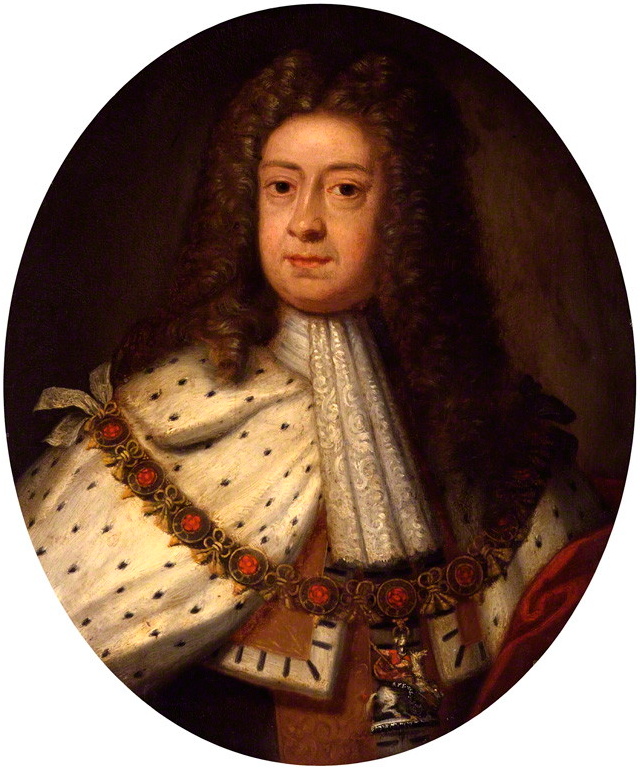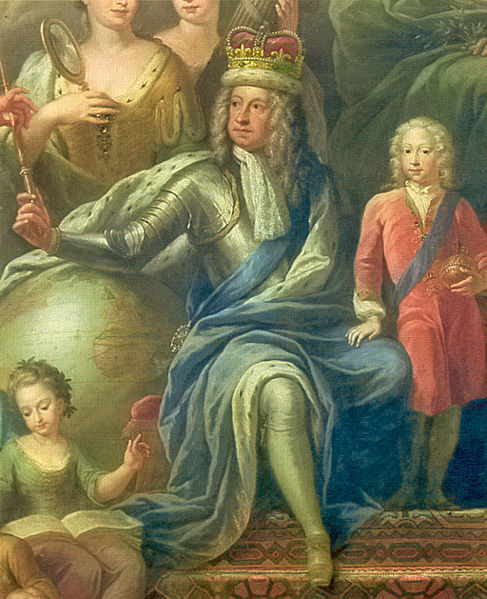by Peter Ackroyd
In the following excerpt from Revolution, Peter Ackroyd transports readers to England in 1714, where Prince George of Germany is about to be crowned King George I of Great Britain.

This image is in the public domain via Wikicommons.
Queen Anne died on the morning of 1 August 1714, and on the same day the high officers of state congregated at the gateway of St James’s Palace where they proclaimed ‘that the high and mighty Prince George, Elector of Brunswick-Lüneburg, is now, by the death of our late Sovereign, of happy memory, become our only lawful and rightful liege Lord, George, by the Grace of God, King of Great Britain, France and Ireland, Defender of the Faith etcetera . . . ’. George had won the race over James Edward. It has been estimated that fifty-seven other people had a better hereditary claim; nevertheless the elector of Hanover, as he was also informally called, was the only Protestant among them and had therefore been acclaimed as monarch.
The cry went up after the proclamation that the Germans were coming in droves, eager to adorn themselves with the treasures of England, but in the event only ninety staff or entourage made the journey with the new king. Among them were the usual courtiers and officials, together with apothecaries and tailors as well as a complete kitchen staff (the culinary expertise of the new and unknown country could not be taken for granted); on the ship also were George’s two Turkish body servants, Mehmet and Mustafa, and two court mistresses who caused almost equal astonishment.
Fräulein von Schulenberg was a lover of long standing, and one of her two ‘nieces’ betrayed a close resemblance to the new king; she had first refused to travel to England with George, according to Lady Mary Wortley Montagu, ‘fearing that the people of England who, she thought, were accustomed to use their kings barbarously, might chop off his head in the first fortnight’. She changed her mind only when she learned that her rival was also on the way. At a later date Horace Walpole, the man of letters and connoisseur, recalled Frau von Kielmannsegge sporting ‘two fierce black eyes, large and rolling . . . two acres of cheek spread with crimson, an ocean of neck that overflowed’.
The London mob was highly delighted by the fact that one was very thin, and the other very fat. It was like a nursery rhyme. The new sovereign’s unhappy wife, Sophia, was not to be seen. She had been imprisoned for almost twenty years in the castle of Ahlden after being found in an illicit liaison with a German count; the count himself disappeared in mysterious circumstances, thus giving the Hanoverian court something of the atmosphere of the castle of Otranto. George’s wife never left confinement, but her son did eventually become king of England.
‘George Ludwig’ landed at Greenwich on 18 September and in the following month was crowned in Westminster Hall. He was not exactly a golden prince. Sophia, before their doomed marriage, had shouted that ‘I will not marry the pig snout’ and thrown his miniature against a wall. She was perhaps a little unfair. He was rather short but his physiognomy was not out of the ordinary; he had a somewhat heavy countenance, with a high broad forehead, which showed little sign of liveliness or animation. He had a large nose and what were described as ‘vacant’ eyes. He was reserved to the point of woodenness, a natural hesitation that made him slow in speech and in thought. As a result he was considered to be stiff and cold in manner, but this may only have been a defensive stance in an alien environment. As Lord Chesterfield said, England was too big for him.

This image is in the public domain via Wikicommons.
It is not clear whether or not he could speak English, but surviving documents suggest that he understood a lot and wrote a little. In any case he had French, the international language of diplomacy, to support him. He had certain characteristics that he shared with the preceding Stuart dynasty, among them ruthlessness and stubbornness. Perhaps these are the traits of any successful monarchy. He had embarked on his first military campaign at the age of fifteen so he could not be accused of faint-heartedness, and he had ruled Hanover for sixteen years. He was no neophyte. Thackeray wrote of him that ‘he was more than fifty years of age when he came among us; we took him because we wanted him, because he served our turn; we laughed at his uncouth German ways, and sneered at him. He took our loyalty for what it was; laid hands on what money he could; kept us assuredly from Popery and wooden shoes. I, for one, would have been on his side in those days.’ Wooden shoes were a token of French servitude.
Since he was by nature reserved and informal he did not keep a majestic court. He maintained an inner German retinue that carried out the necessary duties, and as a result he seemed to his subjects to be essentially remote. He rose early but did not emerge from his chamber until noon to consult his ministers; after these meetings and conferences, which could last as long as three hours, he retired once more to his bedchamber. He walked in the gardens of St James’s in the late afternoon, and spent the evening playing cards with one of his mistresses. Visits to the opera or theatre were occasional, and they were not accompanied by any ritual or fanfare; the king avoided the royal box. The courtiers themselves were not vainglorious; they did not dazzle; there was no attempt to maintain the cult of monarchy. With the exception of Mustafa and Mehmet, and of course the thin and the fat mistresses, there was nothing exceptional about them.
The new king came to England with an instinctive dislike of Tories. He believed, rightly or wrongly, that many of them still supported the Stuart cause. And he could not forgive the Tory politicians who engineered the treaty of Utrecht by leaving their allies deserted on the field, of whose number he was of course one. Nevertheless it was widely believed that, like Anne, he would attempt a moderate administration combined of both parties; but in practice this even-handedness lasted for a moment only.

Peter Ackroyd is an award-winning novelist, as well as a broadcaster, biographer, poet, and historian. He is the author of the acclaimed London: The Biography, and the first, second, and third volumes of his history of England, Foundation, Tudors, and Rebellion. He holds a CBE for services to literature and lives in London.
